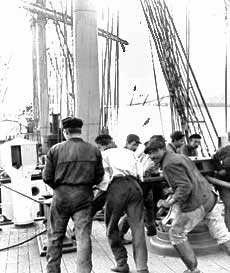A Voyage Round the World Onboard the Ship Columbia Rediviva and Sloop Washington by Third Officer Robert Haswell is a journal of a two ship commercial expedition to the Pacific Northwest. This voyage was an investment venture headed by Joseph Barrell and inspired by Captain James Cook’s third voyage to the Pacific. The main object of this voyage was to acquire fur pelts and carry them back across the Pacific ocean and trade the pelts in Canton, China for a small fortune. This expedition would prove to be Haswell’s first exposure to the Pacific Northwest and his perspective would eventually assist future historians in their research.
From the moment Haswell and the crew first spotted land on August 2, 1788, they were awestruck with the land’s beauty. Sailing up the coast Haswell describes the countryside as “beautifully divercified with forists and green verdant launs which must give shelter and forage to vast numbers of wild beasts (30)” while also noticing that there were many campfires indicating a large populace. Further sailing up the coast invoked another such description, “above the beach appeared a delightfull Countrey thickly inhabited and Cloathed with woods and verdure with maney Charming streems of water gushing from the vallies (30).” Haswell’s attention to detail, including recording longitude and latitude would also prove to be helpful to historians.
Not only did Haswell keep good notes on the countryside, he also wrote descriptive accounts of his encounters with the natives of this wild land. Haswell would describe the physical attributes of the natives and their manner of dress. He wrote of their clothing “they ware curious conical caps on their heads but their feat and legs are all-ways bare in very rainey or coald weather they generally ware a Bear Woolf skin or dears (61)” and even included a summation of their physical cleanliness and hygiene. The “curious conical caps” were also mentioned by Mary Malloy in her April 27, 2007 class lecture and validates Haswell’s description.
Haswell has the insight to realize that the fur traders had encountered a vast country, full of resources, uncharted territory and native peoples. To survey and map this territory, Haswell turns a pensive pen to his log when he writes, “trading vessels to this coast will make considerable advances towards this but it never can be thoroughly done intill it is done at some national expence whose Commanders are uninterested by commerce (100).” Perhaps Haswell had no idea of the historical impact that his log book would make; but stating the necessity for national organization in order to complete this task demonstrated his perception.
The incredible diligence and perspective of Robert Haswell, Third Officer of the Columbia-Rediviva, would provide much information and cross reference material to those who piece together the collective pasts and histories of the people and the events that helped shape Pacific Northwest history. From the forests primeval to the people that inhabit them, Robert Haswell had a part in how we perceive them today.
